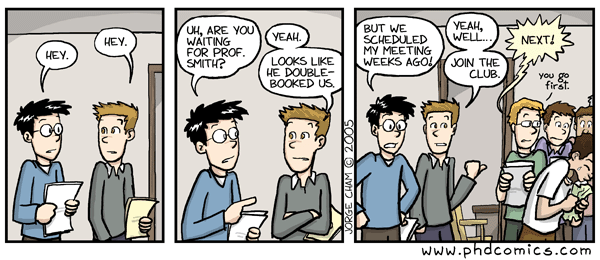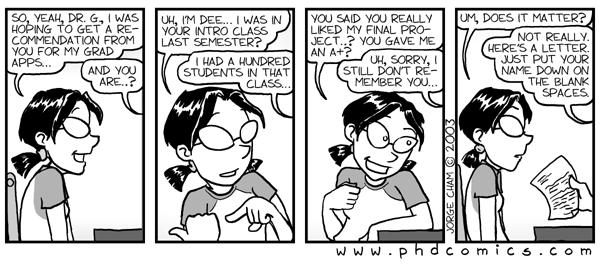
(The inimitable work of Jorge Cham.)
You express your interest by email, I ask you to write up a short email to answer a few questions, then I accept some students. Often it is a matter of matching interests; don't read too much into a negative response.
Please check your batch newsgroups for instructions specific to your batch.
I am influenced by overall CPI but am more directly concerned with grades in some specific courses: Data Structures, Paradigms, Undergrad Probability and Statistics, Databases, etc.
In your email include relevant self-study and past projects. If applicable, write about any technical problem you have pondered over in the area of interest. I will probably hold a short interview after I read your emails.
I will start you off with a few papers but you are expected to find more on your own. We will have an ongoing email conversation and irregular meetings on demand. At the meetings you will describe papers that I have not read yet, and ask me questions about papers I have read.
See comments later on pacing yourself and writing the report with ample time to spare.
We meet in these situations:

Every week (Monday preferred) you write up a 5--10 line email stating
You will be able to figure out how attracted I am to your project. Work to keep up the tempo. Please do not disappear for months and then send emails like this one (actual email).
Dear Sir, It is very hard for me to write this mail. For many weeks now, I have been avoiding meeting you fearing that I dont have any results to show you, and that has added to my misery, making a vicious circle that's very hard to break. I desperately wish to set things right (or atleast close to it). Can I meet you sometime soon. Thanks.

You must start it off well in advance (at least three weeks ahead of the department deadline) by proposing an outline (ASCII email) and we will take it from there.
The end of the semester is very hectic. To give us enough time to iterate through your reports at least once, preferably twice, I want a fairly complete (some tables and charts might be missing, but all work reported) draft of your reports and slides 10 days before the official deadline. Otherwise you might get an II grade. You are responsible for keeping track of these dates.
Your report should be on A4 pages, reasonably filled out with not more than 1 inch margins. For seminars, 10--20 pages is a typical length. For projects, 30--40 pages is a typical length. These are just representative numbers. You can do a great report in 5 pages if you say something impressive, or 100 pages, if you can hold the reader's interest.
I prefer that you prepare the report using LaTeX. If you find it tedious to type LaTeX directly using emacs or vi, consider using a LaTeX IDE. Apparently there is a LaTeX plugin for Eclipse now!
Use the article format, not the book format for you report, provided your examiner and chair are agreeable.
There must not be any pages dedicated to acknowledgments, list of tables, list of figures, or table of contents, again assuming you have prior approval from the examiner and chairperson.
How much attention I give your report depends on how interesting and pleasant it is to read, obviously. Here are some tips you should take very seriously.
Read and follow important rules from the classic text by Strunk and White. If you have the time (you should) go through Mathematical Writing by Knuth, Larrabee and Roberts.
Apart from the rest of the report, the bibliography/reference section must be typeset properly, with enough info to trace each citation. Author name, title, and venue/journal are required. Also give either page numbers or a live URL.
No plastic sheets or binders are to be used. Print on both sides of the paper and staple in the upper left corner only.
Make sure no material is lifted from another source without due credit. It will be considered dishonest to do so.
In case you are involved in a team project or closely-related seminars, you are responsible for making sure that there is no direct copying of material from one report to another.
There is no short-cut around practice talks. For the first 30-minute seminar talk in your life, you must try at least three trial sessions.
Use some software to prepare slides that does not make you reluctant to use diagrams and sketches. Old SliTeX definitely does, but there are now some GUI wrappers around LaTeX that might be better. Powerpoint is rather nice in this regard, although math typing is a bit painful.
Do not use a style with baroque banners, semi-outlines in the margins etc. such as produced by Beamer. Use a white or light background and large black or dark sans-serif fonts.
Wordy slides are not as good as slides with examples and pictures. But if you take them from some source, acknowledge them on the slides immediately.
In an ideal world where we all had lots of time, I would attend the last of your practice talks. With increasing class sizes this is becoming very difficult. This is a good opportunity for students to pick up general knowledge about CSE research, so please give each other practice talks!
Here are some tips on preparing delivering talks:
A seminar talk must be self-complete when directed to a CSE faculty member from any sub-area of CSE.
It is a test of your skill to choose material that you can cover in a self-complete manner in 20 minutes, that will encourage listeners to read the rest of your report. Don't plan to cover all papers you have read.
On the other hand, a series of 2--3 project talks are just that, a series. CSE tries to retain the same panel, so you should note down your panel, meet panel members (other than the advisor) mid-semester to refresh their memories of who you are, and that way, reduce the need to set up context during talks. Thereby we can delve into details earlier on in the talk.
If I have agreed to give you a recommendation letter, send me an email with your recent resume in plain text, the list of places where you are applying, university stationery if any, and stamped, addressed outer envelopes. I will mail the letters directly. It is your responsibility to send me a reminder on time such that if I ship out the letter from IIT the day you remind me, you can still make the deadline.
